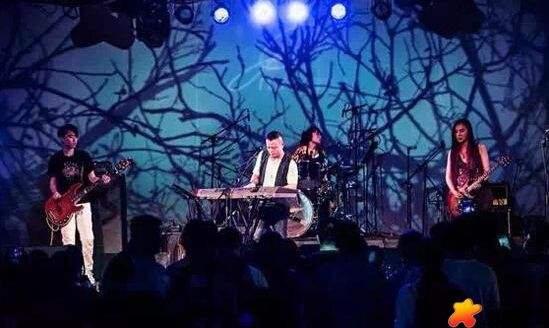(单词翻译:单击)
情景对话
Hana: Okay. Sorry to ask stupid questions but ...
哈娜:好。很抱歉我要问一个愚蠢的问题,不过……
Ben: No, no, go ahead.
本:没事,你问吧。
Hana: So the guitar that you used to use it's that one that sort of connects to the amplifiers?
哈娜:你们乐队用的吉他是那种要连接扩音器的吗?
Ben: Yes.
本:对。
Hana: Not like acoustic guitar?
哈娜:不是原声吉他?
Ben: No, everyone played electric loud, loud music.
本:不是,所有人演奏的都是吵闹的电子乐。
Hana: Okay.
哈娜:好。
Ben: Yeah.
本:嗯。
Hana: Loud music.
哈娜:吵闹的音乐。
Ben: Yeah, very loud guitars.
本:对,非常吵的吉他。
Hana: Okay. Why do you or why did you like punk music?
哈娜:好。你为什么喜欢朋克音乐?
Ben: I don't know. I was a high school student and I was angry about life and my parents. I didn't really get along with my parents. And so, it was a good outlet for me, a way to express myself outside of school. And so, it was very useful in that way. That's why I liked it.
本:我也不知道。当时我是高中生,我对生活和父母感到不满。我和父母相处得不好。所以,朋克音乐对我来说是一个很好的宣泄出口,是在校外表达自己的方式。这种方法非常有用。所以我喜欢朋克音乐。
Hana: Did you have a chance to sort of perform in public?
哈娜:你有机会在公开场合表演吗?
Ben: Yeah, you know it's funny because we thought ... when you're 15 years old you can't really think too far ahead in the future but we thought, "We're going to be popular. People are going to like this and we're going to get big. Maybe we don't have to go to college. Maybe we can just play music for the rest of our lives."
本:有,这很有趣,在15岁时通常不会考虑遥远的未来,但是我们当时想,“我们要出名了。人们会喜欢我们的音乐,我们会变得很有名。也许我们不一定要上大学。也许我们可以余生都演奏音乐。”
Hana: Right.
哈娜:好。
Ben: But yeah, no, back to your question sorry. We probably played a show as we call it or like we would play at different venues around, different live houses around in our town.
本:但是,抱歉,现在我来回答你的问题。我们办了演出,我们是这样认为的,或者说我们在家乡的不同场馆和音乐表演空间进行了演出。
Hana: Yeah, oh cool.
哈娜:哦,真酷。
Ben: Probably like twice a month.
本:大概1个月表演2次。
Hana: All right.
哈娜:好。
Ben: We'd sell tickets. I'd go actually we'd make a flyer and I would go to the top of the stairwell in the high school and I would take all these flyers and just throw them down the stairs, just have the flyers ... I don't know it sounds funny to talk about it now, but yeah.
本:我们办的是售票演出。我们会印制传单,然后我会到高中楼梯的顶部,把所有传单扔下楼梯,现在说起来听着挺可笑的,不过当时我们就是这么做的。
Hana: All right.
哈娜:好。
Ben: So we played like twice a month for about three years.
本:我们每个月表演两次,大概持续了三年。
Hana: Wow. So you used to make money from that then.
哈娜:哇哦。你从那时就开始挣钱了。
Ben: I don't know about money but we did make enough to pay for our cd's that we would record.
本:我不太清楚钱的情况,不过我们挣的钱足以用来录制唱片。
Hana: Oh wow.
哈娜:哇哦。
Ben: Yeah.
本:对。
Hana: Wow.
哈娜:哇哦。
Ben: No, it wasn't profitable in any way it was just fun. And I met so many different people from being a band so it was really, really, it was really nice. Socially it was really good for I think a high school student like myself.
本:当时并不是为了挣钱,而是为了乐趣。因为加入乐队,我遇到了很多不同的人,这非常不错。从社交方面来说,这对我这种高中生来说是有好处的。
Hana: Oh, that's interesting.
哈娜:哦,有意思。
Ben: Yeah, thanks. Thanks for asking.
本:嗯,谢谢。谢谢你的问题。

译文属可可原创,仅供学习交流使用,未经许可请勿转载
重点讲解
重点讲解:
1. go ahead 进行;
Go ahead! There's nothing to be afraid of.
干吧!没有什么可怕的。
2. used to do sth. 过去常常;过去曾;
There is no doubt that the relationship between family members is not as close as it used to be.
毫无疑问,家庭成员之间的关系已经不像以前那么亲密。
3. get along with (与…)和睦相处;
I want to get along with everyone.
我想和大家和睦相处。
4. be good for 有利的;有益的;
The healthful air at the seaside is good for you.
海边健康的空气对你有好处。


